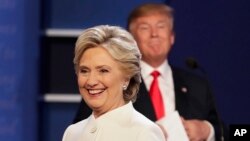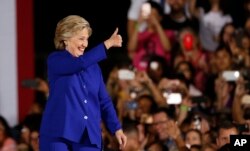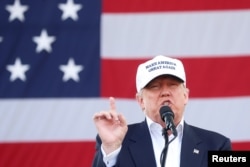With the U.S. presidential election only days away, new polling results indicate the race has tightened, with Democratic candidate Hillary Clinton clinging to a narrow lead over Republican Donald Trump.
The RealClear Politics national average on Thursday showed Clinton holding on to a thin 47 percent to 45.3 percent lead over Trump among likely voters — a dip from her 49.0 to 41.9 margin on October 18.
A New York Times/CBS News poll released Thursday also showed the distance between the two candidates has tightened, with Clinton holding a 45 percent to 42 percent lead over Trump in a four-way race that includes Libertarian Party candidate Gary Johnson and Green Party nominee Jill Stein.
"I don't see that she's dropped that much," University of Maryland political science professor James Gimpel said in an interview with VOA. "What's different is that Trump has come up, but it's not been at her expense."
Gimpel said Johnson is paying the price for Trump's gains in recent polls as some reluctant Republicans are "coming home" to their Republican nominee.
Clinton backers shrug off emails
The New York Times/CBS News poll began hours after FBI Director James Comey sent a letter to congressional leaders Friday announcing he will revisit the inquiry into Clinton's improper use of emails when she was secretary of state. But, Gimpel said, Clinton's generally stable poll standings have been mostly unaffected by the controversial FBI investigation.
"How people can be saying that the Clinton campaign is falling through the floor and that the Comey investigation has caused it? How they can be saying that is pure fantasy," he said.
University of Virginia Center for Politics political analyst Geoffrey Skelley agrees the FBI inquiry has not adversely affected Clinton, even though recent polls show the race has tightened.
Skelley told VOA the FBI disclosure made little difference among Democrats, and most independent voters have already committed to the candidate of their choice.
"But Republicans are now more enthused and more likely to support Trump,” he said, “probably because … a reminder [of] the email scandal for Clinton has reminded Republicans that they really don't like Hillary Clinton."
As the two candidates enter the final stretch of what has been a contentious presidential campaign, Clinton must encourage voters to go to the polls, according to Fordham University political science professor Christina Greer.
"It's all about turnout, and she really needs to make sure that African-Americans and young people and Asians and Latinos vote," Greer said in an interview with VOA. "Forget about white men, that ship has sailed. They're not with her, so don't waste your time on that demographic."
Battleground states
Greer believes Clinton needs heavy turnout among her targeted demographic groups because the two third-party candidates, despite their negligible standings in the polls, may get enough votes in certain swing states to have a significant impact when Electoral College votes are tallied "because we are in a winner-take-all system."
The Trump campaign should devote all its resources on battleground states where "he seems to be moving upward at the expense of Johnson," Gimpel said.
WATCH: Electoral College Plays Key Role in US Vote
"I also think [Trump] needs to focus on the economic message, which was always his winner: focus on the wreck Obamacare has become and otherwise keep his mouth shut," Gimpel advised.
Although the race for the White House has tightened just before the November 8 election, Skelley said the factors behind the movement may just be "noise," but cautioned, "It may not be all that meaningful, but that's where we are, and so Clinton's position as a favorite is tenuous."
Clinton's strong standing is based on her position in several swing states seen as key for securing enough electoral votes for victory.
U.S. presidential elections are not decided by a national popular vote. Instead, they are decided by individual races in the 50 states, with each state's importance in the overall outcome weighted by its population.
Winning presidential candidates have to amass a majority of 270 votes in the 538-member Electoral College based on the state-by-state results. The RealClearPolitics website projects that 236 electoral votes are firmly in Clinton's camp and 180 in Trump's. The remaining 132 votes are where the race will be determined.








